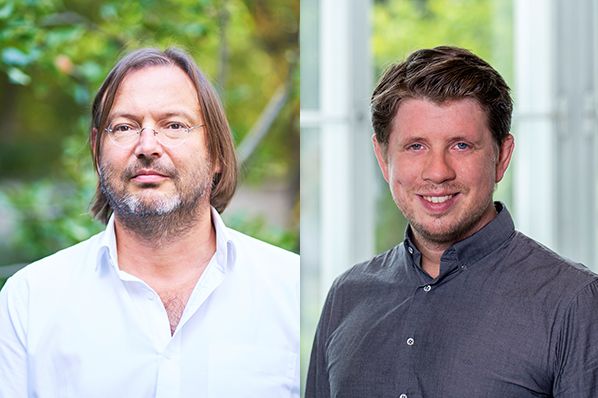
(Vienna, 15 April 2021) Vienna Medical Association has awarded the Ring of Honour endowed by Paul Watzlawick to Stefan Thurner and Peter Klimek, MedUni Vienna complexity researchers working at the Complexity Science Hub Vienna (CSH). They were and still are the people who forecast the development of the coronavirus pandemic using Big Data and the integration of various data received from authorities and institutions. This involves the interlinking of different pieces of information and potential influencing variables.
As a result of the coronavirus pandemic, Peter Klimek and Stefan Thurner have become known to a wider audience. "Every complex system contains inherent networks. Understanding these networks is quintessential to the understanding of complex systems, their dynamic behaviour, how they respond to stress, demonstrate robustness or collapse. You can only understand a system when you know how the building blocks relate to each other," says Thurner, who published the book "Die Zerbrechlichkeit der Welt" [The Fragility of the World] only a few months ago, speaking in a Vienna Medical Association broadcast.
Together with his colleague Peter Klimek, he has worked on complex problems relating to climate change, migration, social inequality, healthcare policy and healthcare provision, as well as financial and ecological systems.
"We want to know how diseases arise"
The study of complex systems is still a young science, an indirect consequence of the information society and the possibilities offered by Big Data for analysing different systems and their interconnectedness.
Stefan Thurner was born in the Tyrol, studied theoretical physics at the University of Vienna and Vienna University of Technology, where he gained his postdoctoral qualification – after completing study placements at Columbia University, Humboldt University and Boston University. Thurner, who also did a degree in economic sciences, has been Professor of the Science of Complex Systems at MedUni Vienna since 2009. Since 2015, he has headed up the Complexity Science Hub Vienna, a unique research institution within Europe.
Peter Klimek studied theoretical physics with Thurner at the University of Vienna and subsequently worked in private research at the European Virtual Institute for Integrated Risk Management and at the International Institute for Applied Systems Analysis. Since 2011, he has been working at MedUni Vienna's Institute for the Science of Complex Systems, where he gained his postdoctoral qualification in computational science before moving to the Complexity Science Hub Vienna together with Thurner.
The two scientists have worked closely together for years and their work is currently focusing on diseases and their spread: "We want to know how diseases arise and how they spread. For this we are working on the assumption of several networks that are failing to fulfil or only partially fulfilling their function."
Both scientists are appealing to the public and to institutions to collect as many data as possible – duly encrypted and anonymised – and make them available to science. "Only Big Data can help us to identify future tipping points and help us to circumvent them."
Interrelating complex systems
"I find it fascinating to see how they interrelate complex systems and, going far beyond identifying the reasons for the spread of diseases, manage to detect early on any major problems that our society is heading towards – be these problems associated with financial systems, models of democracy, climate challenges or social inequalities and the threat of their fragmentation," says Elisabeth J. Nöstlinger, Chair of the Paul Watzlawick Ring of Honour jury, commenting on the scientific importance of the field of research in which the two Ring of Honour recipients are involved.
"We are proud that this year we are honouring two researchers who are helping to identify current problems in our society and to find possible solutions to these problems. This goes far beyond the Covid-19 problem," says Medical Association President Thomas Szekeres.
About the Paul Watzlawick Ring of Honour
The Vienna Medical Association's Paul Watzlawick Ring of Honour is a tribute to Austrian communication theorist, psychotherapist, and co-founder of the theory of radical constructivism, Paul Watzlawick, who was born 100 years ago. The Ring of Honour is awarded to prominent figures who follow the cross-disciplinary, humanistic approach promoted by Paul Watzlawick in their work and in their research.